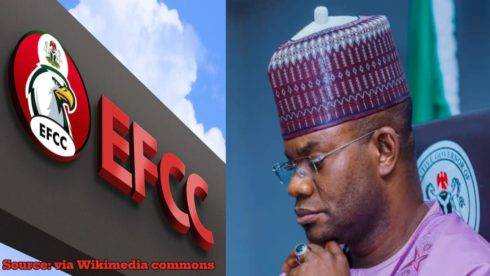The Economic and Financial Crimes Commission (EFCC) has lodged fresh charges against former Kogi State Governor, Yahaya Bello. The latest legal actions are centered around allegations of fraud amounting to N110,446,470,089, as presented in a new charge filed at the Federal High Court in Abuja. The EFCC claims that Bello’s actions constitute a criminal breach of trust, violating sections 96 and 311 of the Penal Code Law of Northern Nigeria, 1963. The ex-governor, who was already facing a 19-count indictment, will now also confront an additional 16-count charge in connection to the case.
The EFCC’s case against Bello marks one of the most significant corruption allegations in recent Nigerian history. Alongside Bello, two Kogi state officials, Abdulsalami Hudu and Umar Oricha, have been implicated in the fraud, further widening the scope of the investigation. The charges reflect the EFCC’s determination to bring top-ranking officials to justice for their role in financial mismanagement and corruption, particularly within state governments.
Details of the Alleged N110.4 Billion Fraud
The fraud charges brought against Yahaya Bello stem from his alleged involvement in the mismanagement and diversion of N110.4 billion in public funds. According to the EFCC, the funds, which were intended for the development of Kogi State, were siphoned off through illicit transactions and used for personal gain. The EFCC argues that the misappropriated sum is among the largest amounts of public money to be linked to a single individual in recent years.
The charges underscore concerns about corruption within state-level governance, particularly regarding how public officials exploit their positions for financial gain. If convicted, Bello and the implicated Kogi state officials could face severe legal consequences, including lengthy prison sentences and the forfeiture of assets linked to the alleged fraud.
Penal Code Violations and Legal Implications
The EFCC’s case against Yahaya Bello is rooted in the violation of specific sections of the Penal Code Law, which was enacted to govern criminal conduct in Northern Nigeria. Sections 96 and 311 of the Penal Code Law address criminal breach of trust and financial mismanagement by public officials. These sections stipulate strict penalties for individuals found guilty of misusing public funds or violating the trust placed in them by their office.
The inclusion of Section 312 in the charges highlights the seriousness of the accusations, as this section lays out the punishments for those found guilty of such breaches. Bello’s legal team is expected to mount a rigorous defense, arguing that the charges are politically motivated, but legal experts anticipate a long and complex legal battle given the scale of the alleged fraud.
Involvement of Kogi State Officials: Abdulsalami Hudu and Umar Oricha
In addition to Yahaya Bello, the EFCC has charged two key officials from the Kogi State government: Abdulsalami Hudu and Umar Oricha. Both are accused of aiding and abetting Bello in the alleged fraud scheme. Hudu, who served as the Director of Finance, and Oricha, a prominent official within the Kogi State government, are said to have played critical roles in facilitating the illegal diversion of funds.
The involvement of these two officials further complicates the case, as it suggests a coordinated effort within the Kogi State administration to siphon off public funds. Their legal representatives have yet to issue detailed responses to the charges, but their inclusion in the case highlights the depth of the alleged corruption and the EFCC’s intent to pursue all individuals involved.
Impact on Governance and Public Perception
The fresh charges against Yahaya Bello and his associates are likely to have far-reaching implications for governance and public perception, not only in Kogi State but also across Nigeria. Corruption and the misappropriation of public funds have been longstanding issues in Nigerian politics, with cases such as this further eroding public trust in government institutions. The EFCC’s decision to pursue high-profile figures like Bello is seen as part of a broader effort to combat corruption at all levels of government.
However, some political observers argue that the case could have political undertones, especially given the timing of the charges and Bello’s influence within certain political circles. Regardless of the outcome, the case is likely to reignite discussions on the need for transparency, accountability, and stronger anti-corruption measures within the Nigerian political system.
Next Steps in the Legal Proceedings
As the legal proceedings against Yahaya Bello and the implicated Kogi state officials unfold, the next steps will involve court appearances and the presentation of evidence by the EFCC. Legal experts anticipate a prolonged court battle, with Bello’s defense team likely to challenge the charges on several fronts, including procedural grounds and allegations of political bias.
The Federal High Court in Abuja is expected to schedule a formal hearing in the coming weeks, where both sides will present their arguments. For now, the case remains one of the most closely watched legal battles in Nigeria, as it could set a precedent for how corruption cases involving high-ranking officials are handled in the future.
Table of Contents
Discover more from OGM News NG
Subscribe to get the latest posts sent to your email.














